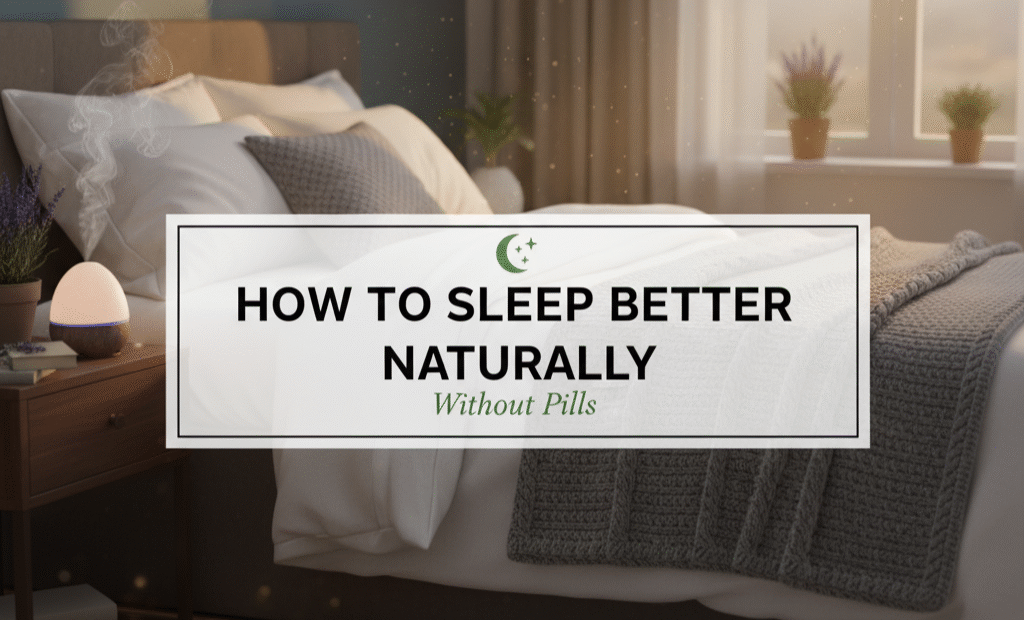Good sleep is the foundation of mental health, physical health, and productivity. Yet millions of people worldwide struggle with insomnia or restless nights. Instead of relying on sleeping pills—which often come with side effects—there are proven natural ways to improve sleep quality. In this guide, we’ll explore lifestyle changes, natural remedies, and practical strategies to help you fall asleep faster and wake up feeling refreshed.
Why Quality Sleep Matters
Sleep is not just rest—it’s a vital process where your body repairs, your brain processes information, and your hormones rebalance. Poor sleep can lead to:
- Weakened immune system
- Higher stress and anxiety
- Weight gain and slow metabolism
- Decreased focus and memory
- Increased risk of chronic diseases like diabetes and heart problems
Getting 7–9 hours of deep, restful sleep is essential for overall well-being.
10 Proven Ways to Sleep Better Naturally Without Pills
1. Maintain a Consistent Sleep Schedule
Your body’s internal clock (circadian rhythm) thrives on routine. Go to bed and wake up at the same time every day—even on weekends. Consistency trains your body to fall asleep faster and wake up naturally.
2. Create a Relaxing Bedtime Routine
Engage in calming activities before bed to signal your brain that it’s time to sleep. This could include:
- Reading a book
- Gentle stretching or yoga
- Listening to calming music
- Practicing meditation or deep breathing
3. Optimize Your Sleep Environment
Transform your bedroom into a sleep-friendly sanctuary:
- Keep the room cool (60–67°F or 16–20°C)
- Use blackout curtains to block light
- Invest in a supportive mattress and pillows
- Reduce noise with earplugs or white noise machines
4. Limit Screen Time Before Bed
Phones, tablets, and laptops emit blue light that disrupts melatonin production (the sleep hormone). Avoid screens at least one hour before bed or use blue-light-blocking glasses if necessary.
5. Watch Your Diet and Caffeine Intake
What you eat and drink plays a huge role in sleep quality. To sleep better:
- Avoid heavy meals 2–3 hours before bed
- Limit caffeine (coffee, energy drinks) after mid-afternoon
- Reduce alcohol—it may make you sleepy initially but disrupts deep sleep
- Opt for sleep-friendly snacks like bananas, almonds, or chamomile tea
6. Stay Physically Active
Regular exercise improves sleep by reducing stress and regulating circadian rhythms. Aim for at least 30 minutes of moderate exercise most days, but avoid intense workouts right before bedtime.
7. Manage Stress and Anxiety
Racing thoughts are a common reason people struggle to sleep. Try stress-reduction techniques such as:
- Journaling before bed to clear your mind
- Practicing mindfulness meditation
- Progressive muscle relaxation (tensing and relaxing each muscle group)
8. Get More Natural Light Exposure
Spending time outdoors during the day—especially in the morning—helps regulate your body’s sleep-wake cycle. Natural sunlight boosts melatonin production later at night, making it easier to fall asleep.
9. Limit Naps
While short power naps can be beneficial, long or late naps interfere with nighttime sleep. If you nap, keep it under 30 minutes and avoid napping after 3 PM.
10. Try Natural Sleep Remedies
Certain herbs and natural supplements can support sleep naturally:
- Chamomile tea – calming effect
- Lavender – promotes relaxation
- Valerian root – may improve sleep onset
- Magnesium-rich foods – support muscle relaxation
Always consult with a healthcare professional before starting supplements.
Extra Tips for Better Sleep
- Keep a sleep journal to track patterns and identify triggers.
- Avoid checking the clock during the night—it increases anxiety.
- Reserve your bed for sleep and intimacy only, not work or TV.
- Try aromatherapy with lavender essential oil.
- Consider a warm bath before bed to relax muscles and promote drowsiness.
FAQs
1. How long does it take to see results from these habits?
Some changes, like turning off screens or drinking chamomile tea, can work instantly. Others, like adjusting your sleep schedule, may take 1–2 weeks.
2. Is it okay to never use sleeping pills?
Yes, most people can achieve restful sleep naturally with lifestyle changes. Sleeping pills should only be used short-term under medical supervision.
3. Can exercise really improve sleep?
Yes. Exercise reduces stress hormones and increases deep sleep stages. Just avoid high-intensity workouts late at night.
4. What is the best natural bedtime snack?
Bananas, warm milk, almonds, or yogurt are excellent because they contain magnesium and tryptophan, which promote sleep.
5. Should I wake up at the same time every day?
Yes. A consistent wake-up time—even on weekends—strengthens your circadian rhythm, helping you fall asleep faster at night.
Final Thoughts
Better sleep doesn’t have to come from pills. By creating a consistent routine, optimizing your environment, eating right, and managing stress, you can sleep naturally and deeply. These small changes compound over time, improving not just your nights but also your days. Remember, sleep is a lifestyle, not a luxury—invest in it, and you’ll see transformative results in your health, focus, and happiness.
Start today with just one or two habits, and within weeks you’ll enjoy deeper, more refreshing sleep—naturally.









